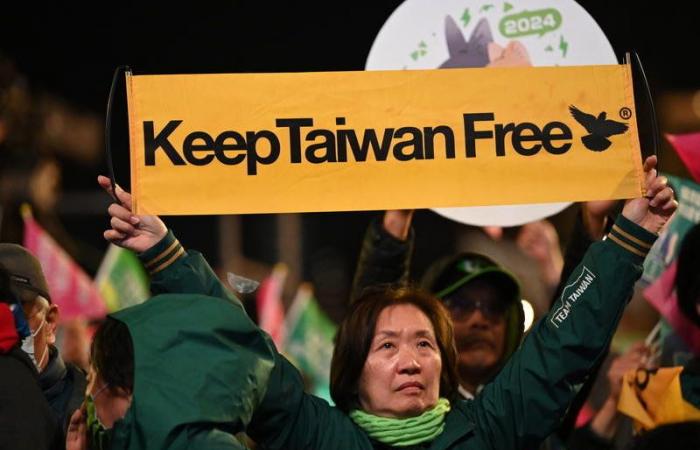Chinese military pressure is growing, but intervention would be costly and could deter Beijing from using force.
Alexandre Gandil
Political scientist, associate doctor at the Sciences-Po International Research Center.
Chinese military exercises on October 14, 2024, simulating a blockade of the island of Taiwan, have once again focused the world's attention on the region. For the fourth time since August 2022, China's People's Liberation Army (PLA) forces have engaged in a chilling display of power, fueling fears of open conflict across the Taiwan Strait. This fear is not recent.
It has existed since the proclamation of the People's Republic of China in 1949. In the process, the regime of the Republic of China, driven from the Chinese continent by the communists at the end of the civil war, retreated into the island of Taiwan. However, for the authorities in Beijing, Taiwan is part of the Chinese nation, which can only be legitimately represented by the People's Republic. In the 1950s, it was this reasoning that led to the outbreak of the first two Taiwan Strait crises, during which the specter of nuclear war loomed.
If, since the beginning of the 1980s, the communist authorities have favored “peaceful reunification”, they have never renounced the use of force. Thus, they qualify as “secessionist” and threaten with sanction any action presenting the Republic of China (Taiwan) as an independent and sovereign state. Therefore, in 1995-1996, the PLA launched missiles around the island in preparation for the first direct election of Taiwan's president, provoking a third crisis across the strait. This is also why, in 2005, China's National People's Congress passed a so-called anti-secession law, legalizing the use of force if all possibilities for peaceful reunification with Taiwan are considered exhausted.
But the recurrence of crises cannot obscure the turning point at the end of the 2010s. The large-scale one-off maneuvers, which focus international attention, are now nothing more than bursts of Chinese military pressure that is both continuous and growing. . In recent years, PLA air and naval patrols have increased. Some even cross the median line of the strait, an unofficial border formerly respected by Beijing, and move ever closer to the island. Since 2020, the Taiwanese Ministry of Defense has been keeping a daily count.
Added to this are other destabilizing and weakening activities carried out by the People's Republic: breaking of submarine cables, sand dredging, drone overflights, outboard boat incursions, etc. Since an amphibious landing operation would be costly and risky, Beijing could instead try to force Taipei to submit without having to wage war. Thus, even before knowing whether China will invade Taiwan, it is in this gray zone of latent conflict that a first red line must be identified, that of the breakdown of the status quo in the strait.
The latest encirclement maneuvers aim above all to show that the People's Republic of China is in a position of strength.
Barthélémy Courmont
Professor at the Catholic University of Lille and research director at Iris
Asking this question leads us to question the feasibility of a Chinese invasion of Taiwan, but also about Beijing's intentions. On this point, Chinese leaders have repeated for decades that Taiwan will ultimately be an integral part of the People's Republic of China, while favoring the path “peaceful”the option of military invasion only arriving as a last resort. The question of feasibility of course refers to the imbalance in capabilities, now clearly to Beijing's advantage, but also to temporality. Therefore, one might ask “when will China invade Taiwan?” “, as if to better consider that the recent maneuvers do not necessarily reflect an imminent move to action, but that they must be taken seriously given possible developments in the cross-strait relationship.
On the occasion of Taiwan's National Day on October 10, President Lai Ching-te, elected last January but who took office in May, gave a speech in which he recalled that neither side of the strait of Taiwan must not be subordinate to the other, and thus reaffirming the foundations of Taiwan's territorial and political sovereignty. Beijing denounced a pro-independence posture, justifying the deployment, on October 14, of a large number of planes and warships. In fact, China initiated an operation similar to that of August 2022, the most important to date, aimed at demonstrating the capacity to encircle Taiwan, before officially declaring the operation completed.
A way for Beijing to send a strong message, to refine its encirclement capabilities, and to remind its neighbor that it is now China that is in a position of strength. But this does not mean that action is inevitable, and Beijing's means of pressure are much more important in other areas, such as diplomacy, the economy or cognitive warfare. A war would only be a last resort, and China has mastered the art of flirting with the red line without crossing it. This should not, however, reassure the Taiwanese, who understand that their neighbor is keeping an eye on them and that the slightest actions are a pretext for growing pressure.
Even if support from Washington is important, the Taiwanese know that, when facing China, they must rely above all on themselves. The day the offensive is launched, it will be too late to provide a response. They are therefore looking for another path, based on deterrence, and invite Beijing to reconsider its ambitions by analyzing the disastrous consequences of such a war for which the Chinese regime could pay the price. This diplomatic route is supported by the two major Taiwanese parties, aware of a risk of tension which would result in an escalation. It is therefore China which allows political leaders divided on many subjects to converge in advancing the sovereignty of Taiwan.
Kinmen, an archipelago between Taiwan and Chinaby Alexandre Gandil, Karthala editions, 2024.
To be the newspaper of peace, our daily challenge
Since Jaurès, the defense of peace has been in our DNA.
- Which still informs today about the actions of pacifists for disarmament?
- How many media point out that decolonization struggles still exist, and that they must be supported?
- How much value do international solidarityand unambiguously commit to the side of the exiles?
Our values have no borders.
Help us support the right to self-determination and the option of peace.
I want to know more!






